Los Angeles
After a delay due to illness, newsboy Charles
After a delay due to illness, newsboy Charles
July 6, 1907
Los Angeles
Hot! damn but it’s been hot and humid, too, the steamiest early July since records have been kept. Sure there were hotter single days–like July 25, 1891 when the mercury topped 109–but no one can recall a week when the very dawn temperature broke 80 degrees, with no relief offered by the night.
Mrs. Carrie Gilbert’s solution to the grisly weather was to get drunk and sleep out-of-doors, not in a cosy sleepying porch at home at 617 1/2 East Sixth Street, but alongside the railway behind the commission house at First and Central Streets. Deep in the darkness her horrible screams were heard; a passing train had severed her left foot. Taken to Receiving Hospital, the lady slipped into a merciful stupor. Clever, clever dipsomaniac. Shock, they say, leaves one feeling icy cold…
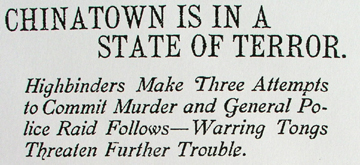
Tong war, born of woman! Of few days, and full of trouble!
Seems there’s always a highbinder war simmering down in Chinatown. But despite the literality of that damn’d “huddled masses” business, there stays an easy peace down amongst the Celestials. Until.
When a Hop Sing Tong all-tong banquet (for those of you not in the know, a Tong could throw down on your local set) was held in the early weeks of June, the Bing Gon Tong was forbidden to attend—and as such, the Bing Gon elected to remove their slave girls from the Chinatown sex market.
And thus comes the storm.
At first the cops—informed (as they are to-day) by merchants and oldtimers who have little stake in any war—spent their time shaking down and locking up local Chinese for carrying Caliente-smuggled firearms, and having hired Caliente gunmen.
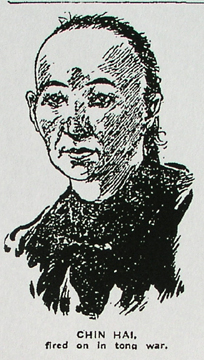
Then Chin Hai, local laundryman and Bing Gon fellow-traveler, was shot at by the Hop Sing Tong, and cops arrested Ah Quay, Ah Mee, Ah Soo, Tom Tong and Wong Kee. After cops picked up these men and the hammerless revolver they (or one, or perhaps none) used in the shooting, two knifing attempts by highbinders went down. It was a busy night. Chinese merchants slept in their stores. They appealed for police escorts. And all cops could uncover in the Chinese interstices were some smokeless-powder cartridges for great-caliber weapons.
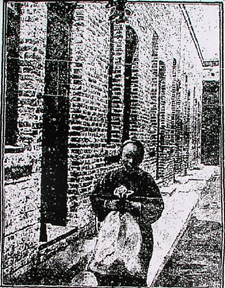 The young and fair Ling Auk, left, who had been friendly to the Bing Gon, was surprised by Hop Sing hatchetmen on June 19. Luckily, they were scared away by her protectors. The Hop Sing Tong has always been the most warlike in the Chinese settlement. They are centered at 529+1/2 North Los Angeles Street, where they have built a walled fortress replete with intricate tunnels that repeatedly prevent their capture. That White girls retire there to smoke opium is a sad, accepted fact of modernity.
The young and fair Ling Auk, left, who had been friendly to the Bing Gon, was surprised by Hop Sing hatchetmen on June 19. Luckily, they were scared away by her protectors. The Hop Sing Tong has always been the most warlike in the Chinese settlement. They are centered at 529+1/2 North Los Angeles Street, where they have built a walled fortress replete with intricate tunnels that repeatedly prevent their capture. That White girls retire there to smoke opium is a sad, accepted fact of modernity.
Outside agitators are, of course, a factor.
Tong representatives from San Francisco are urging bloodshed. 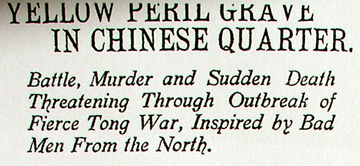
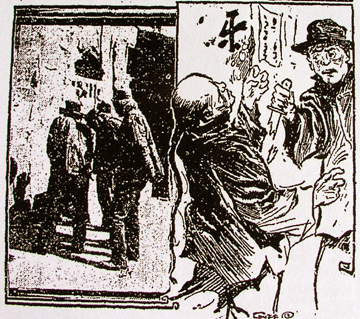
Meanwhile, the bloodthirsty boys of the Hop Sing have donned their mail. What looks like an ordinary quilted silk Chinese coat to the naked eye actually conceals a screen of steel links, bullet and knife and, most importantly to the tong war, hatchet-proof.
Legendary San Fran avenger Lu Fook has even arrived in town; he is storied to have survived four shots in the back while his followers killed six hatchetmen. Heavy muscle from up north always makes copper flee in LA; where in SF the Great Six Companies War Board settle tong differences, Los Angeles just has some officers watching the trains to note incoming highbinders and look on as the Oriental Quarter, centered at Alameda and Marchessault Streets, erupts in bloodshed.
Luckily, Wong Fong, mayor of the San Francisco Chinatown, was called to Los Angeles last week to settle the dispute. Sui Hoo Fow and Sam Ham Gay were named as the perps in the Chin Hai shooting, and were ostracized by their tongs. Again we settle into an uneasy, easy peace.
June 29, 1907
Los Angeles
Police are in possession of a pleading letter, penned by Chicago hardware store merchant O.A. Derrough, and intended for the eyes of his runaway son Joseph. In the month since the 16-year-old ran off with cousin Robert Smith, both of their mothers have fallen into a pitiable state. Mrs. Smith is a nervous wreck, while Mrs. Derrough claims that she is dying–but that all will be right again if her boy will only send word that he is alive.
Derrough contacted the Los Angeles police with his plea because the boys had sent a picture postcard with a local postmark. He believes his son is using the name Adams, and asks that officers do everything in their power to find the Chicagoans and persuade them to return home.
Five years ago, Mrs. C. P. Rapp lived in bustling Sioux City, where everything was hunky-dory. Sure, there was that famous unpleasantry in 1900 with the John Pierce swindle, but that
June 14, 1907
Sonoratown
Mrs. Santos Rodriguez (nee Galvies) has a lover, Virde Parra. She also has a little 3-year-old daughter, and watching the babe was putting a crimp in her romantic life. A quick trip down to the druggist provided mama with what was almost certainly a bottle of lauadanum, that effective blend of opium and alcohol so beloved by Coleridge and de Quincey. As the child slipped into a powerful sleep illuminated with extraordinary visions, Santos slipped out of her little house at 643 Buena Vista Street and met Virde for a quickie at the La Guerra Hotel on North Main Street near Market.
But the lovers’ plans were thwarted when the lady’s husband, having heard rumors of her evening wanders and Parra’s visits, came home for an early dinner and discovered his child insensible. Patrolmen Leon and Murphy were called, and the child-doper and her honey were quickly found and placed in police custody, where the lady gave her maiden name and refused to talk about the case.
More marital bliss! At six p.m. Frank Harrington, 38, was drinking in a saloon at Thirty-Eighth and Central with his buddy George Tanner. Tanner asked if Frank was feeling better, after having been under the weather of late, to which Frank merely replied “No–I feel bad.” Frank took off home, and the next thing Tanner heard were pistol reports. He dashed a short distance to the Harrington home, 3505 Central, where the Harringtons resided behind the delicatessen in which Frank and his wife Susanna tended shop. Tanner made a terrible discovery.
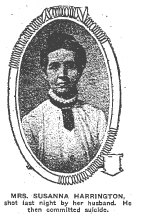
Frank’s brains were on the floor. Mrs. Harrington, 52, had had a bullet pass from behind her left ear, tearing away her palate on its egress; another entered behind her right eye and exited through the right side of her face, a third left a bad opening across her forehead. The coroners were called.
Coroners take their own sweet time, because, after all, what’s the rush? Their bodies therefore lay on the floor for two hours before the wagon came. One thing, though. The Harringtons were still alive.
The papers state that Harrington, at Receiving Hospital, is still alive but “liable to die at any moment.” Mrs. Harrington was removed from Receiving to Good Samaritan Hospital, where it was reported that she never lost consciousness through the ordeal.
Acquaintances note that despite the couple’s interesting age difference, Mr. Harrington was often jealous, and the two therefore quarreled routinely.
Further investigation into news accounts of the time does not reveal whether one or both of the Harringtons survived and, if they did, whether they stayed together afterward, thereby fulfilling the old “til death do us part” pledge.
Stationery engineer Samuel E. Moss, of 704 East Fifth Street, is still strapped to a bed in Receiving Hospital today, having been arrested in Westlake Park the night of the 21st after attempting suicide with an overdose of bromide.
It seems Mr. Moss, who has no apparent motive for the act (“He is a magnificent specimen of manhood and that he should so fondly court death seemed peculiar to the police,” the Times informs), was thwarted by a crafty druggist. Druggists have come under State Board of Pharmacy scrutiny of late–usually because they’ll sell opium to any and everyone–and so when Moss asked for a “big dose of carbolic”, the pharmacist slipped him the bromide.
In Westlake Park, Moss gulped down the bromide, which made him sick and semiconscious; he was picked up by a Westlake Park Special Officer.
Every morning since his induction to Receiving, attendants ask Moss if he wants to live. And every morning he says no, which confounds Chief Surgeon Garrett. “He is one of the most remarkable prisoners I have ever known. Ninety-nine people out of a hundred who try to commit suicide do so in a fit of despondency. When they are saved, they are only too glad to be alive. This man seems as strong in his desire for death now as he did when he took the drug and restraint seems about the only remedy for him.”
Questioning his Fifth Street rooming house cohabitators revealed nothing. Moss acts and speaks rationally, merely stating “If I don’t want to live, that’s no one’s business but my own.” And so his morning questioning continues–and if he continues to answer in the negative, Garrett will have no other recourse but to file a complaint with the State Board of Insanity Commissioners.